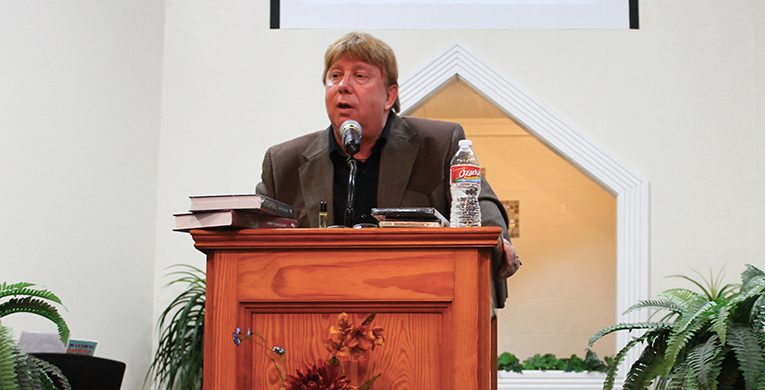
Michael Kavitz/Printz
Johnny Clary, a former National Imperial Wizard of the Ku Klux Klan told the story of his first conversation with an African-American to the Abundant Grace of Petal congregation Feb. 1-2 in Petal, Miss.
Established in 1866, the Ku Klux Klan spread through the southern United States by 1870. The KKK carried white southern resistance to the Republican Party’s Reconstruction-era policies aimed at establishing political and economic equality for African-American, according to a historical highlight by History.com.
Clary said he was called to take part in a radio debate with an African-American minister, Wade Watts, a preacher and civil rights activist who worked with Martin Luther King and Thurgood Marshall.
“I remember thinking he would show up in an African dashiki with bones hanging from his neck, and a button on his chest that read ‘I hate honkies,’” Clary said. “I figured he would come in with a great big boom box blurting out the the theme song from Shaft or with Curtis Mayfield singing ‘Superfly.’”
Clary said he was shocked at what happened next.
“I went into the studio and there was a nicely dressed man with a bible in his hand,” he said. “He put his hand out to me and said, ‘My name is Reverend Wade Watts, and I just came here to tell you I love you and Jesus loves you.’”
Clary said he shook his hand because it caught him off guard. “The Klan rule book says you cannot touch people of other colors, so I jerked my hand back,” he said. “I called him every name in the book.”
According to Clary, Watts told him not to worry, (the black) won’t come off. “He told me, you can’t do enough to make me hate you,” Clary said. “I never forgot that.”
He returned to the Petal church Sunday to give his complete testimony.
Clary, now an associate pastor and evangelist with Jimmy Swaggart Ministries Family Worship Center in Baton Rouge, La., was welcomed to the Petal church to spread his message of racial reconciliation through his experience with the KKK.
Robbie Bankens, pastor of Abundant Grace of Petal, invited Clary after hearing his testimony of reformation in Baton Rouge in 2013.
“His testimony impacted so many lives and it’s a story that everybody ought to hear,” Bankens said. “He goes from a life of total hatred.”
This is the second year Clary has spoken to the Petal church. “The night he came and gave his testimony, the place was packed out,” he said. “I am of the belief that Jesus Christ came and died for one race, not black race or a white race, but the human race.”
Singing in the church’s choir was Dora Carter of Petal, who said she marched with Martin Luther King.
“I marched with Doctor King, and this was one of the things he hoped to see one day,” Carter said. “He wanted to see God’s people come together and not be so concerned about the color of skin.”
Carter said she listened to Clary’s testimony last year, and said it shows change.When asked about what happened to make him him change, Clary said there was no “aha moment.”
“It was a process of several years; hatred is a learned response,” he said. “So is love and change.”
Clary said the higher he climbed in KKK leadership, the more trouble started to happen. He said he began to question a lot of the things the Klan was doing and teaching.
“As you get older, like Pastor Paul said, when he became a man, he put away childish things,” Clary said. “Some of the things they were doing got pretty childish.”
When questioned about whether he feels the good he is doing now makes up for all of the bad in his past, Clary said he has learned that you cannot change the past but you can take steps toward a better future for tomorrow.
“I look back over my life in the last 25 years, and I have done more to damage the Klu Klux Klan and hate groups than I ever did to promote them,” he said. “The Klan actually hates me more than they hate a black person or a jewish person.”
Clary said he has been preaching the Gospel all over the world, while helping kids get out of gangs and helping with the Federal Bureau of Investigation. He said he has also helped the United States Armed Forces.
Clary started Project Mississippi Brotherhood in 2013 and his mission was to build bridges of diversity to end racism. “I have been going to different parts of Mississippi and so far the black people I have met have took me seriously.”
Clary said there is hate on both sides. “There’s blacks that hate whites as much as there are whites that hate blacks,” he said.
For more information about Jimmy Swaggart Ministries Family Worship Center, visit www.jsm.org.























